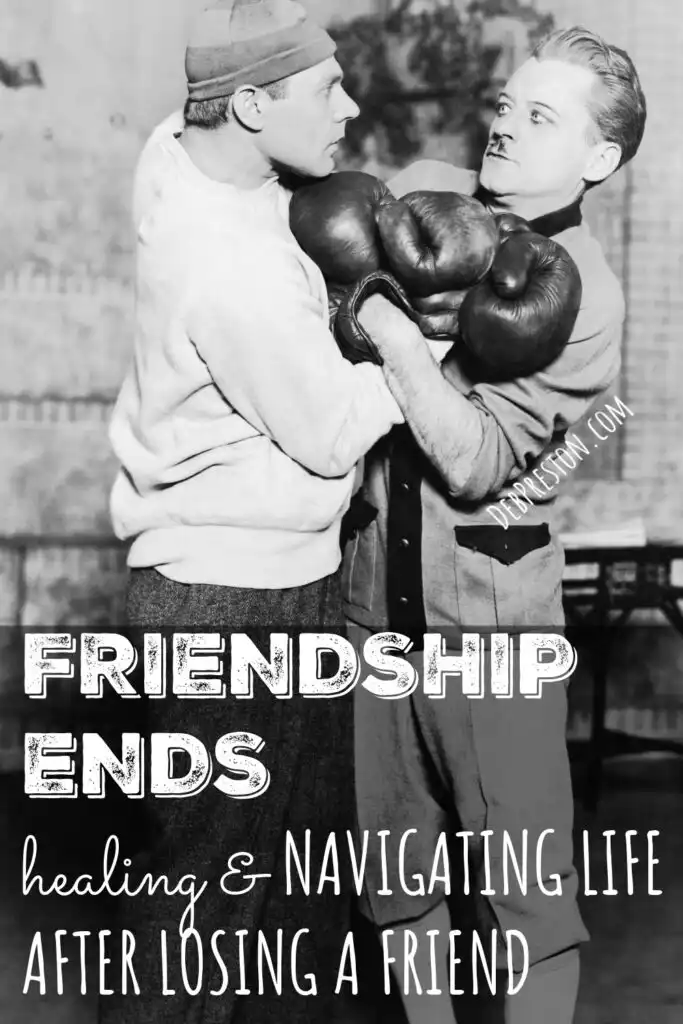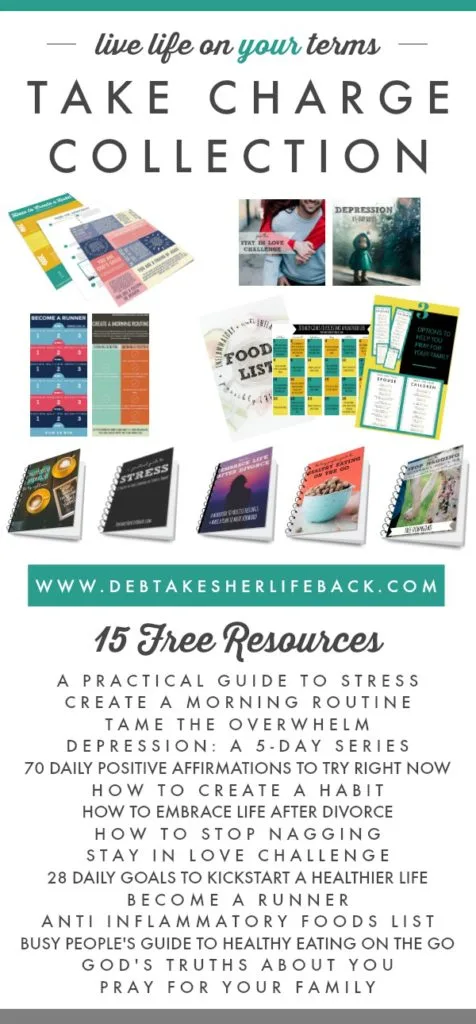We used to be inseparable, my friend and I. We’d text back and forth throughout the day, get our kids together at least once a week, and share our most private thoughts and concerns with one another.
But over time, it became harder and harder to make plans with her. She was always too busy or overwhelmed.
Then her text replies became more and more delayed. Soon, she was more guarded, withholding her struggles and putting on a carefully-curated front.
I felt hurt, frustrated, and confused as to what had changed between us. Was it something I did? Was she secretly mad at me?! What do you do when a friendship ends?
Recognizing Signs of a Fading Friendship
When a friendship ends, it usually doesn’t happen at the drop of a hat. There are signs leading up to it that can help to clue you in on the direction the relationship is taking.
Lack of Reciprocity
It’s natural for friendships to have ups and downs, but if you notice that the effort you put into the relationship is not being reciprocated, it may be a sign the friendship is fading.
Pay attention to whether you’re always the one initiating plans or offering support, but your friend doesn’t return the favor. This lack of reciprocity can leave you feeling unappreciated and undervalued, which may lead to a decline in the overall quality of the friendship.
Decreased Contact
Another sign of a fading friendship is decreased contact.
You may notice that your friend is not as responsive to your calls, texts, or invitations. They may cancel plans consistently or even stop reaching out to you altogether.
Over time, this can create an emotional distance between you and your friend, indicating a shift in the friendship’s dynamics.
Trust Issues
Trust is a key component of a strong, long-lasting friendship.
If you’re having trust issues with your friend, it could be the result of broken promises, dishonesty, or other actions that have shaken the foundation of your relationship. When trust is compromised, it’s challenging to rebuild, and a lack of trust can ultimately weaken the friendship.
Toxic Friend
Finally, if you’re dealing with a toxic friend, your friendship may be on the brink of ending.
A toxic friend could exhibit negative behaviors, such as controlling tendencies, constant criticism, or passive-aggressive actions, which can affect your mental well-being and life quality. In these situations, it’s essential to prioritize your own emotional health and consider whether maintaining the relationship with a toxic friend is worth the stress and strain it puts on your life.
Remember, friendships naturally evolve over time, and it’s important to recognize the signs of a fading friendship so you can address the issues and make a decision that’s best for you and your emotional well-being.
Emotional Impact and Grieving
There’s an emotional impact when a friendship ends. After all, you’re losing someone you love and a support system you’ve counted on for a season or even years.
No matter what emotions you experience – sadness, frustration, anger, grieving, or something else – it’s all completely normal and expected and okay.
Loss of a Friend
When a close friendship ends, it’s natural to feel an emotional impact.
Losing a friend can sometimes make you spiral into depression, with feelings of worthlessness, hopelessness, and helplessness. This void can be difficult to navigate, as you might experience hurt feelings and a sense of loss for the connection you once had.
Coping with Pain
It’s essential to practice compassion toward yourself during this difficult time. Allow yourself to feel the pain and grieve for the lost friendship.
Remember that it’s okay to cry and acknowledge the loss – doing so is neither silly nor indulgent. It’s perfectly normal to experience a range of emotions when coming to terms with the end of a friendship, including:
- Sadness
- Anger
- Confusion
- Relief
Be kind to yourself and give yourself the time and space to process these emotions. Reach out to other friends or seek professional help if needed.
Healing Process
The healing process can look different for everyone. However, there are a few steps you can take to work through the pain and move forward.
- Acceptance: Accept that the friendship has ended and that it’s okay to feel a sense of loss.
- Redirect your energy: Focus on building new relationships and strengthening existing ones, or engage in hobbies and activities that bring joy to your life.
- Reflect and learn: Try to gain insight into the reasons for the friendship’s end and use this as an opportunity for personal growth.
Remember, healing can take time, and there is no predetermined timeline for when you should “get over” the loss of a friend. Give yourself permission to grieve and heal at your own pace.
With time and patience, you’ll find the emotional impact of losing a friend reducing, and you’ll be able to cherish the memories you shared and move forward in a healthy, positive way.

Addressing the Cause
One important component of healing when a friendship ends is addressing and learning from the cause of your separation. These lessons can either rekindle the flame of your current friendship or better equip you for your next friendships.
Conflict Resolution
Conflicts can arise in any friendship, but effective conflict resolution can prevent these disputes from ending the relationship. When facing disagreements, it’s essential to keep an open mind and express your thoughts calmly.
Practice active listening, and make an effort to understand your friend’s perspective. Remember, you both should feel heard and respected.
Avoid negative assumptions about your friend’s intentions, and don’t be too quick to judge their actions. Addressing conflicts with empathy and compassion can create space for growth within the friendship and boost both your confidence and theirs.
Reevaluating Expectations
Sometimes, friendships falter because of unrealistic or mismatched expectations. It’s important to reevaluate what you both expect from each other.
Start by reflecting on the following:
- Time and communication: Are your expectations around how often you interact with your friend compatible? Consider both in-person meetings and digital communication.
- Support: What level of emotional or practical support do you expect from one another? How can you both ensure that these expectations are met?
- Level of commitment: Are you both committed to maintaining the friendship through highs and lows? Are you comfortable with the depth of your connection?
- Interests and activities: Friendships can change as your individual interests evolve. Assess if shared hobbies or activities still bond you, and be open to exploring new interests together.
By examining these aspects and discussing them with your friend, it can help both of you to understand your partnership better and establish healthier expectations for the friendship. The key is to have open, honest communication, and be willing to adapt and grow together.
Ending a Friendship with Dignity
How to End a Friendship
Ending a friendship can be a challenging and emotional experience. When you realize that a friendship no longer serves your needs or has become toxic, it’s important to approach the end with dignity and respect.
Communicate your feelings clearly, honestly, but with kindness. You may decide to have a conversation in person, over the phone, or even through a written letter.
Remember, you have the right to prioritize your well-being, and sometimes it means ending connections that no longer bring happiness.
Closure
It’s perfectly natural to feel a mix of emotions when a friendship ends, and it’s essential to give yourself time and space to process those feelings. Acknowledge the good times you shared, and be grateful for the memories.
Closure can be achieved by reflecting on the reasons for the friendship’s breakup, such as distance, a lack of shared values, or a toxic dynamic, and understanding that it’s a part of life. Recognizing that friendships can naturally fade or end helps you maintain a healthy perspective.
Moving On
Moving on from an ended friendship can take time and self-compassion. Allow yourself to grieve and heal at your own pace.
Surround yourself with other friends or family members who bring positivity to your life, and don’t hesitate to seek help from a mental health professional if needed. Engage in activities that bring you joy, and explore new interests to establish fresh connections.
Remember, life is full of opportunities for growth and change, and by moving forward with dignity and grace, you’re opening doors to even more fulfilling relationships.

Rebuilding and Personal Growth
Cultivating New Friendships
It’s essential to focus on cultivating new friendships after an old one has ended. Make it a priority to meet new people who share your interests and values.
You can join clubs or social groups, attend events, or even volunteer for causes that are close to your heart. By doing so, you’ll create a diverse and fulfilling social circle.
Remember to be open and genuine in your interactions and allow yourself to connect on a deeper level with others.
As you build new friendships, it’s important to invest your energy wisely.
Focus on the relationships that bring you joy and encourage your growth. Remember that quality always matters more than quantity when it comes to friendships.
Learning from Experience
When a friendship ends, it’s an opportunity to reflect on what you’ve learned from the experience.
Think about the factors that contributed to the end of the friendship and how you might have contributed to the outcome. This self-reflection will help you grow and avoid repeating patterns in the future.
Don’t hesitate to seek therapy or the advice of a therapist to gain more insight into your personal growth and relationships. They can help you navigate complex emotions and identify any potential barriers to forming healthy friendships.
Remember, your best friends are the ones who support your growth and help you become the best version of yourself.
Recognizing the Value of a Friendship
When you’re considering ending a friendship, it’s important to take a step back and reflect on the worth of that relationship in your life.
Friendships provide emotional support, a sense of belonging, and valuable memories. Often, these connections can last longer than romantic relationships, making them essential parts of our lives.
However, not all friendships remain the same, and sometimes drifting apart or facing challenges can lead to the decision to end a connection. When you consider a friendship’s value, remember to think about whether it still brings you joy and lifts your spirits – or has it become a source of stress and unhappiness?
Dealing with breakups can be difficult, especially when it’s a long-standing friendship.
It’s crucial to acknowledge the emotions you feel during this time and give yourself the space to cope. Be patient and allow for the natural grieving process to occur.
Breaking up with a friend is never an easy decision, but sometimes it’s necessary for the well-being of both parties involved.
By considering the worth, impact, and health of your friendship, you can make an informed choice about whether to continue or end the friendship. Remember, it’s okay to prioritize your happiness and emotional well-being – after all, that’s what a true friend would want for you, too.

Frequently Asked Questions
How to handle a friendship ending?
It’s normal to feel sad and disappointed when a friendship ends.
Allow yourself to feel those emotions, and do not bottle them up. Seek support from other friends or family members, and consider joining support groups or talking to a therapist if needed.
What are common reasons for friendships ending?
Common reasons for friendships ending include betrayal, growing apart, one-sided friendships, changing life circumstances, and disagreements that cannot be resolved. Remember, not all friendships are meant to last forever, and sometimes, it is healthier to let go.
How to know when it’s time to end a friendship?
It might be time to end a friendship if you consistently feel drained or unhappy after spending time together, there is a lack of trust, or the friendship no longer aligns with your values. Listen to your intuition and consider if the positive aspects of the friendship outweigh the negative.
What is the best way to end a friendship without causing pain?
While it is not always possible to end a friendship without causing some pain, you can minimize the hurt by being honest, yet gentle, about your feelings. Use “I” statements to express your emotions without pointing blame, and choose an appropriate time and place for the conversation.
How to cope with the end of a friendship?
Coping when a friendship ends involves processing your emotions, seeking support, and allowing yourself time to heal. Engage in activities that bring you joy, focus on nurturing other relationships, and find new ways to make friends to replace the void left by the ended friendship.
How to move on after a friendship has ended?
Moving on after a friendship has ended takes time and patience. Do not rush the healing process, and be kind to yourself.
Try to learn from the experience, focus on personal growth, and keep an open mind for new friendships that may come your way. Remember, you are not alone, and many people have experienced the end of friendships.

P.S. Ready to escape survival mode? Start living life on your terms! The Take Charge Collection of 15 free resources will help you to simplify, organize, and take charge of your life! Get yours free HERE!
Disclosure: While all opinions are our own, we are a participant in the Amazon Services LLC Associates Program and other affiliate advertising programs, designed to provide a means for us to earn fees by linking to Amazon.com and affiliated sites, at no additional cost to you.




Laura
Monday 24th of July 2023
This post really resonated with me. I've lost touch with friends over time, and it's so hard to make new ones in adulthood. So, it's hurtful to see them move on and think I wasn't worth continuing a friendship with. My sister is also going through this now as well, and I can tell how badly it affects her. Thanks for providing some reassurance that it happens and that it can be overcome.
Deb
Wednesday 26th of July 2023
It really is one of the worst feelings, especially when you've shared a lot of history together. It hurt me for my daughter too, who didn't understand why her friends' mom was suddenly always too busy to see her. 😭 I've come to appreciate my friendships for the seasons I have them, but to realize that different seasons/interests/paces of life will bring different friends in with them and might take the friends when they go. You're so right though, it's much harder to make friends as an adult...especially when you're an awkward introvert like myself! haha